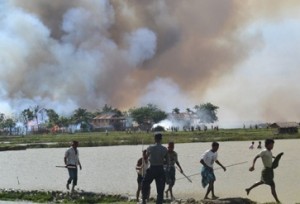Posts Tagged ‘Two-child policy’ (1 found)
Two-Child Policy in Arakan State: Latest Act of Ill-treatment, Unlikely to be the Last
 Last week, Arakan State officials, following recommendations from the internationally-rejected 186-page report of a government-appointed commission, announced a mandatory two-child policy to ‘help ease tension’ in Buthidaung and Maungdaw provinces where the majority of the population is Muslim. A year after two bouts of violence in Arakan State, this two child policy, that applies predominantly to the Rohingya population, is perhaps the most obvious outline of potential ethnic cleansing that many have voiced their concerns about, most noticeably in the last Human Rights Watch report. “The state government is trying to use the Rakhine investigation recommendation, which is outrageous, to justify a policy of limiting births of Rohingya,” said Phil Robertson, Asia deputy director of Human Rights Watch.
Last week, Arakan State officials, following recommendations from the internationally-rejected 186-page report of a government-appointed commission, announced a mandatory two-child policy to ‘help ease tension’ in Buthidaung and Maungdaw provinces where the majority of the population is Muslim. A year after two bouts of violence in Arakan State, this two child policy, that applies predominantly to the Rohingya population, is perhaps the most obvious outline of potential ethnic cleansing that many have voiced their concerns about, most noticeably in the last Human Rights Watch report. “The state government is trying to use the Rakhine investigation recommendation, which is outrageous, to justify a policy of limiting births of Rohingya,” said Phil Robertson, Asia deputy director of Human Rights Watch.
This policy announcement also marks the government’s first ‘official’ act of segregation since the outbreaks of violence that displaced as many as 125,000 Rohingya. From burning of mosques, targeted attacks on Rohingya families, denial of identity, and the implicit support of the 969 anti-Muslim campaign, now comes population control. It is unlikely to stop. This time it’s clearer than ever that the government is backing the agenda behind a campaign against the Muslims in Burma. Win Myaing, a Rakine State spokesperson said that the Rohingya population in the area is growing ten times faster than the Buddhist Arakanese and is one of the causes of the tension. Although population pressure on scarce socio-economic resources in the area should be taken into consideration, this policy serves only one purpose – defeat of the ‘unwanted’ Rohingya population […]









 All posts
All posts